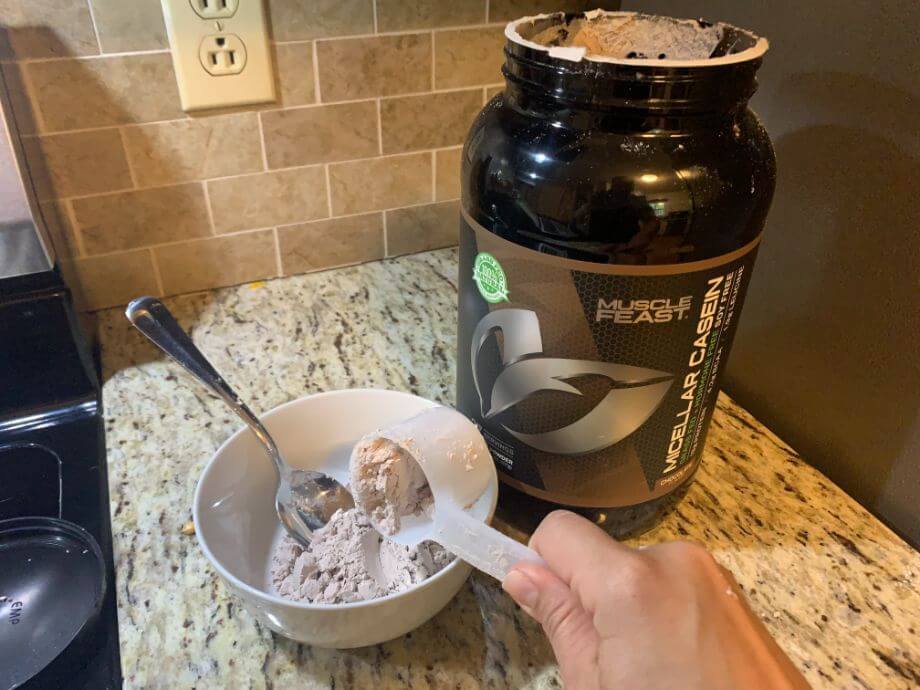If you’re new to the world of resistance training, it may surprise you how much nutrition plays a part in your performance, recovery, and overall body composition.
However, your friends here at Garage Gym Reviews work hard to debunk myths and misconceptions about all things related to nutrition and dietary supplements. This includes the common question: What is casein protein?
We will look into what exactly casein is, where it comes from, the benefits of using it, and how it differs from whey protein.
Plus, our expert panel of registered dietitians and product testers have tested, reviewed, and written in-depth content on everything from the best BCAA supplements to the best time to drink a protein shake. Essentially, if you want to learn more about supplements, you’ve come to the right place.
Medical disclaimer: This article is intended for educational and informational purposes only. It is not intended as a substitute for medical advice. For health advice, contact a licensed healthcare provider.
What is Casein Protein?
The first thing you need to know is that casein protein is found in cow’s milk and other dairy products like cheese and yogurt. In fact, casein is the predominant protein source in dairy products, the other (much smaller) portion coming from whey.
RELATED: What is Whey Protein?
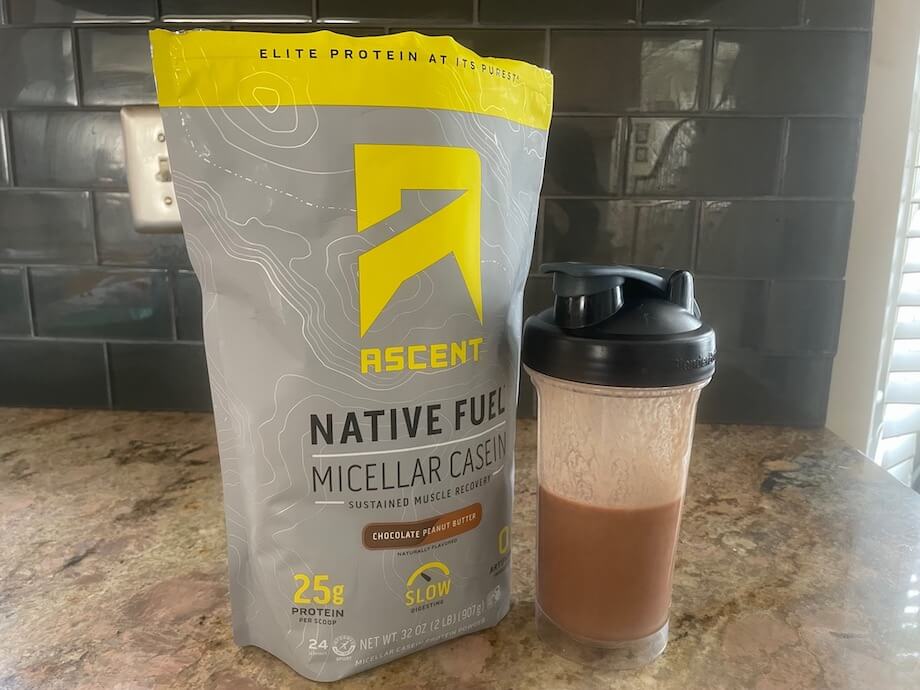
Now that we know that cow’s milk is the source of casein protein, let’s discuss how it becomes a powdered supplement that we buy in stores and online.
What Is Micellar Casein Protein?
Micellar casein is the highest-grade casein available, as it feeds your body a steady stream of amino acids.
In cow’s milk, casein proteins are tiny particles called micelles. When enzymes are added to milk (typically during the cheese-making process) it causes the casein proteins to aggregate and coagulate into solid masses.
Next, acid (typically in the form of lemon juice or vinegar) is added to the milk, which causes casein micelles, that have formed into solid masses, to separate from the liquid and form curds.
Essentially, when you add enzymes and acid to milk, it causes the whey and casein to separate from each other. Casein forms curds while whey remains a liquidy substance.
Once the separation happens, the curds can be strained out of the liquid and processed further—either to make the best casein protein powder, or the curds are used for dairy products like cottage cheese and cheese curds.
Sources of Casein
You can find casein protein in a variety of food sources and supplements. Here are some ways to incorporate casein into your diet.
Dairy Products:
- Milk
- Sour cream
- Cheese (especially cottage cheese)
- Yogurt
- Kefir
Supplements:
- Micellar casein protein powder
- Casein protein bars
- Blended protein supplements (containing both whey and casein)
Casein Protein Dosage Suggestions
Determining the right dosage of casein protein can optimize its benefits for muscle growth and recovery. Scientific research suggests varying dosages based on factors such as body weight, sex, and specific fitness goals.
- General recommendation: A common guideline is to consume 0.5 to 1 gram of casein protein per kilogram of body weight daily.
- For men: Men engaged in intense training may benefit from a higher intake, around 30 to 40 grams of casein protein per serving.
- For women: Women might find 20 to 30 grams per serving sufficient to support muscle recovery and growth.
- Before bedtime: Consuming about 40 grams of casein protein before bed is often recommended to maximize muscle protein synthesis1 during sleep.
When You Should Take Casein Protein?
Timing casein protein intake is crucial to leverage its slow-digesting properties fully. The best time to consume casein is about 30 minutes before bed, as it provides a steady release of amino acids throughout the night, aiding in muscle repair and growth during sleep. This can help prevent muscle breakdown and support recovery, making it particularly beneficial for athletes and people who lift weights regularly.
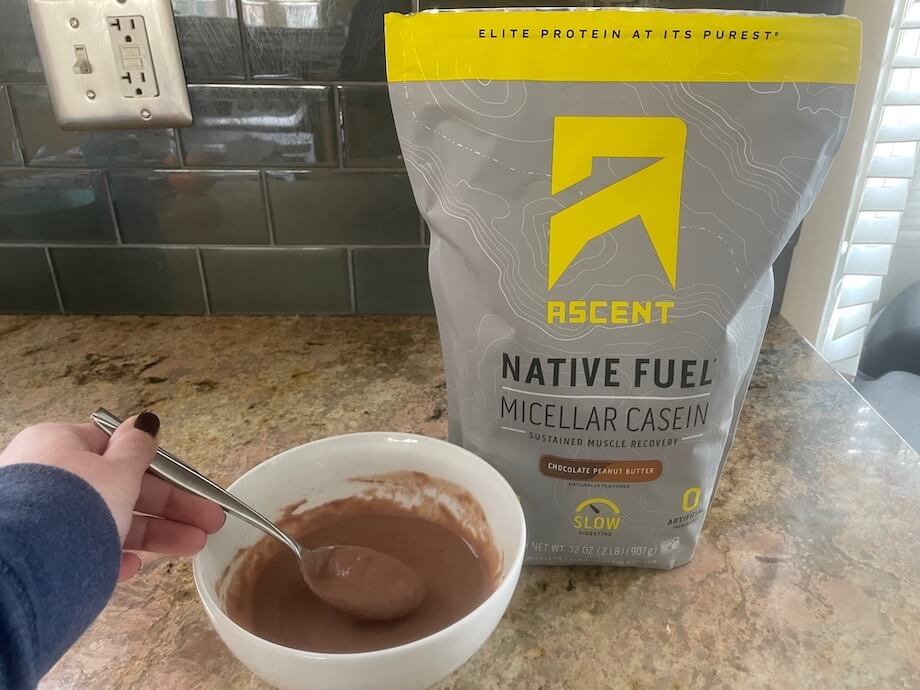
In addition to bedtime, you can take casein protein during prolonged periods between meals to maintain a steady supply of amino acids and help control hunger. Its slow digestion rate makes it an excellent option for those looking to stay full and satisfied for longer periods, aiding in weight management and overall muscle maintenance.
Health Benefits of Casein Protein
Protein is essential for you overall health, but here are the top three benefits specific to introducing casein to your supplement routine:
Build Muscle to Support Your Fitness Routine
Whether you’re new to strength and conditioning or you’re an experienced lifter, you probably know that consuming protein helps you strengthen your muscle fibers and grow muscle mass.
Protein is one of the three macronutrients, with the other two being carbohydrates and fats. You need all three of these macronutrients to function properly and keep your body running like a well-oiled machine.
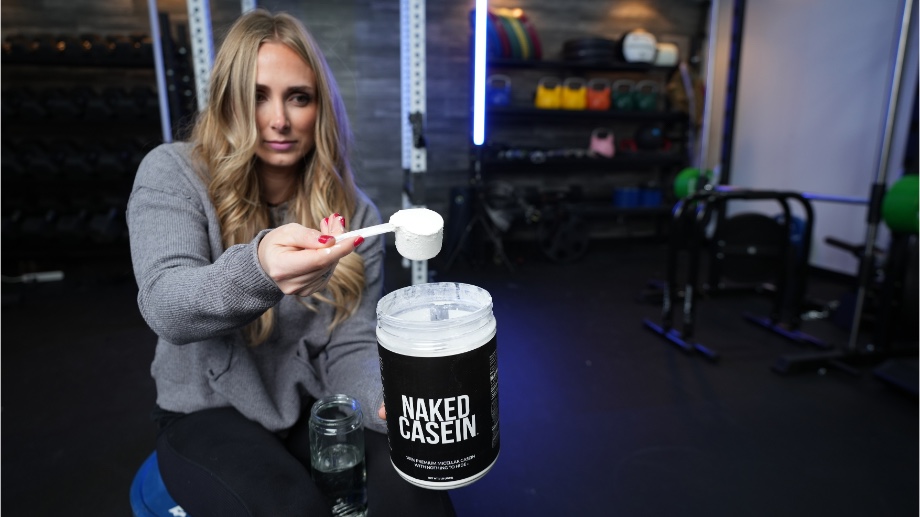
All that said, casein protein can be used as a dietary supplement by recreational lifters, bodybuilders, and athletes alike to maintain muscle and support the development of muscle protein synthesis as you chase strength gains in the gym.
RELATED: How Much Protein Do I Need?
Calcium
Another benefit of casein protein is that it contains calcium, which is commonly known as a mineral important for your overall bone health. However, one 2019 review published by Nutrients2 explores other benefits of calcium such as reduction of hypertensive disorders of pregnancy, lower blood pressure, prevention of osteoporosis, and lower cholesterol values.
Complete Protein Profile
There are two main sources of protein: animal and vegetable. While the debate on which is better may never stop, an abstract published by the Journal of Sports Science Medicine3 notes that animal proteins provide a complete source of protein, while vegetable sources generally lack one or more of the essential amino acids.
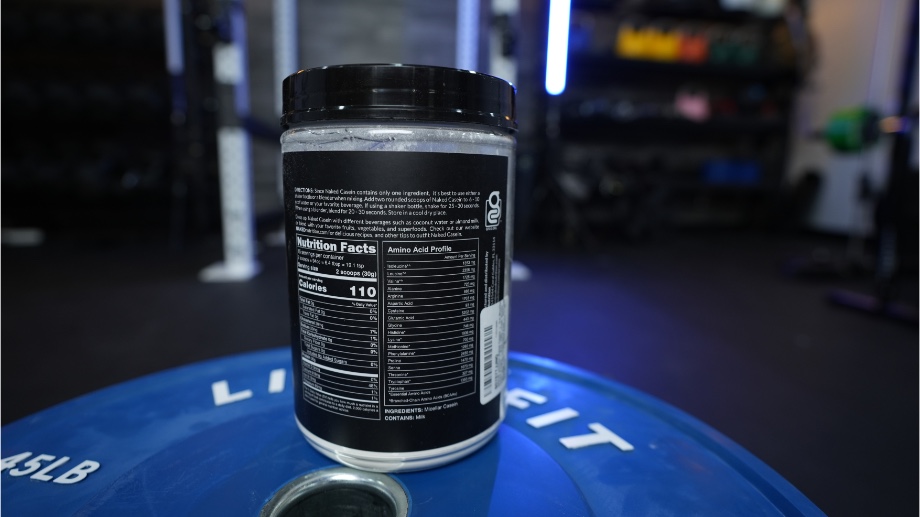
Casein protein is an animal protein, making it a high-quality complete protein with all the essential amino acids. According to the 10th Edition of the Recommended Dietary Allowances4, there are nine amino acids that are considered necessary for you to ingest because you (and other mammals) do not naturally produce them.
The nine amino acids that are considered essential include:
- Histidine
- Isoleucine
- Leucine
- Lysine
- Methionine
- Phenylalanine
- Threonine
- Tryptophan
- Valine
Slow-Digesting Protein
Another benefit of casein protein powder is the fact it is digested slowly. Remember when we went over how casein forms curds during the cheese-making and extraction process?
Well, the same thing happens in your digestive system. Casein basically forms solids during digestion (aka it curdles), which takes it longer for your body to break it down and absorb all the beneficial proteins and amino acids.
RELATED: Best Protein Powder
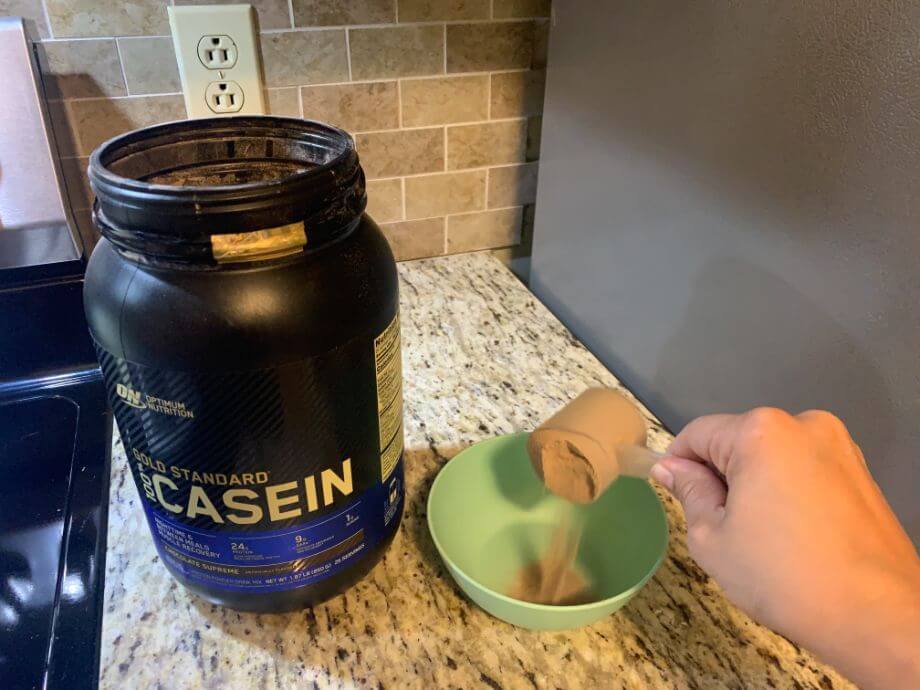
You can essentially think of casein as a delayed release of proteins and nutrients. According to one 2020 systematic review published in Physical Activity and Nutrition5, ingesting casein before bed (after an evening workout) can potentially help increase protein synthesis, promote muscle recovery, and reduce muscle soreness.
Satiety
Related to the way casein absorbs slowly into your digestive system, it can help keep you feeling full and satiated for longer periods of time. However, high-protein meals and protein intake in general can help you feel fuller longer and help you reach weight loss and body composition goals.
RELATED: Best Protein Powder for Weight Loss
According to a 2009 trial published by Physiology Behavior6, researchers found that appetite ratings were similar for all three types of protein: casein, whey, and soy protein. The same study also found that whey protein powder increased hormonal changes (like insulin) more than casein or soy.
Drawbacks and Side Effects of Micellar Casein
Because micellar casein is a product derived from milk, if you suffer from a milk allergy you should avoid casein. Allergic reactions may cause hives, rashes, and tongue and throat swelling. If you have a lactose intolerance you may experience discomfort during digestion. This can include bloating, gas, cramps, diarrhea, or even constipation.
Also, keep in mind that protein supplements can’t replace meals and eating whole foods. Protein powders are a tool to supplement your food-based diet—you’ll still want to focus on intaking plenty of fiber and whole foods to meet your micro and macronutrients goals.
Additionally, if you have kidney or liver problems you’ll need to consult your healthcare provider before taking casein protein or any other type of protein supplements.
How is Casein Different from Whey Protein?
Both whey and casein provide complete animal protein sources derived from milk. It’s ultimately a personal preference on which one you prefer to use. As with any supplement, it’s never a bad idea to consult with a healthcare professional or a registered dietitian to determine the best protein supplement for your specific needs.
That said, here are the main differences to consider:
Absorption Rate
While it’s neither better or worse, and totally depends on your goals, the two proteins absorb at completely different rates. Earlier I mentioned that casein protein pretty much curdles in your digestive systems and creates somewhat of a solid substance, with a slow-release over time.

On the flip side, whey protein is rapidly absorbed by your digestive system, which is why many bodybuilders and lifters like drinking protein shakes immediately after a workout.
RELATED: When to Drink a Protein Shake
Amino Acid Profile
Casein and whey protein are both considered complete proteins. However, a 2019 study7 published by Nutrients examines the amino acid availability in different proteins including these two types of milk protein.
Casein protein has a slightly higher content of glutamine, which is an amino acid that supports immune function and can potentially aid in muscle recovery. And whey protein has a slightly higher concentration of leucine and isoleucine, which is essential for muscle protein synthesis—aka muscle gains.
Texture
Although less to do with the benefits of using casein vs whey, there is a texture difference between the two milk-based products. When using the protein powder to make a shake, casein is typically thicker (which is not surprising based on the extraction process) while whey usually delivers a thinner liquid. Many bodybuilders even use casein for making puddings or high-protein desserts.
Final Thoughts: What Is Casein Protein?
Although whey protein is one of the most popular ways to ingest protein supplements, casein is an unsung hero of muscle recovery. It may not be the powerhouse player in muscle protein synthesis, but the high content of glutamine allows for muscle recovery and improved immune function.
It’s safe to say you know more about casein protein than you did earlier today. Here are a few points to highlight what you read:
- Casein is a milk protein, derived from the cheese-making process
- During the production process, casein curdles into solids and separates from liquid whey
- Casein has more glutamine than whey protein; glutamine can potentially help with muscle recovery, although more research needs to be done
- Casein digests slowly, which can provide a delayed release of protein and amino acids, promoting satiety
FAQ: What Is Casein Protein?
Here are some frequently asked questions when it comes to casein protein:
What does casein protein do?
Casein protein is a complete protein that you can add to your diet for muscle growth, muscle recovery, overall satiation, and reaching your daily protein goals. Ensuring you are intaking enough grams of protein per day is essential for anyone trying to build (or even maintain) muscle mass.
What are examples of casein protein?
Casein protein can be found in powder form, much like whey protein powder. However, if you’ve ever eaten cheese curds or cottage cheese, you’ve had casein!
What’s the difference between casein and whey protein?
The main differences between whey and casein protein are the absorption rate and the amino acid profile. Whey protein has higher content of the branched-chain amino acid leucine, which is a huge component to muscle protein synthesis.
Casein, on the other hand, has a slightly higher glutamine content, which can potentially be helpful for muscle recovery, reducing muscle soreness, and improving immune function.
What are the negatives of casein protein?
Casein protein may cause digestive discomfort, gas, or bloating for those who are lactose intolerant or have dairy sensitivities. Additionally, its slow digestion rate may not be suitable for post-workout recovery if you seek rapid protein absorption.
These statements have not been evaluated by the Food and Drug Administration. This product is not intended to diagnose, treat, cure, or prevent any diseases.
References
- Kim, J. (2020). Pre-sleep casein protein ingestion: New paradigm in post-exercise recovery nutrition. Physical Activity and Nutrition, 24(2), 6-10. https://doi.org/10.20463/pan.2020.0009
- Cormick G, Belizán JM. Calcium Intake and Health. Nutrients. 2019;11(7):1606. Published 2019 Jul 15. doi:10.3390/nu11071606
- Hoffman JR, Falvo MJ. Protein – Which is Best?. J Sports Sci Med. 2004;3(3):118-130. Published 2004 Sep 1.
- National Research Council (US) Subcommittee on the Tenth Edition of the Recommended Dietary Allowances. Recommended Dietary Allowances: 10th Edition. Washington (DC): National Academies Press (US); 1989. 6, Protein and Amino Acids.
- Kim J. Pre-sleep casein protein ingestion: new paradigm in post-exercise recovery nutrition. Phys Act Nutr. 2020;24(2):6-10. doi:10.20463/pan.2020.0009
- Veldhorst MA, Nieuwenhuizen AG, Hochstenbach-Waelen A, et al. Dose-dependent satiating effect of whey relative to casein or soy. Physiol Behav. 2009;96(4-5):675-682. doi:10.1016/j.physbeh.2009.01.004
- Liu J, Klebach M, Visser M, Hofman Z. Amino Acid Availability of a Dairy and Vegetable Protein Blend Compared to Single Casein, Whey, Soy, and Pea Proteins: A Double-Blind, Cross-Over Trial. Nutrients. 2019;11(11):2613. Published 2019 Nov 1. doi:10.3390/nu11112613


